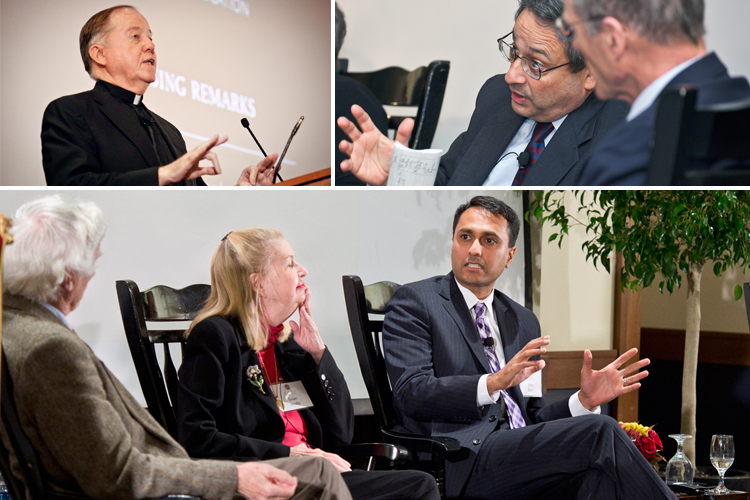
By
Five current and former university presidents joined University President William P. Leahy, SJ, and a group of distinguished scholars last week for a two-day symposium to discuss the place of religion amid the liberal aims of higher education.
Held as part of the University’s Sesquicentennial Celebration, “Religion and the Liberal Aims of Higher Education” took place Nov. 8 and 9 in the Heights Room of Corcoran Commons.
Panels brought together the leaders of religiously-affiliated institutions, as well as scholars from diverse backgrounds to discuss what sets religious colleges and universities apart from their secular peers who share the similar commitment to offering a liberal education.
“The question for me isn’t whether religion, theology and belief have a place in the liberal university,” Fr. Leahy said in his closing remarks. “The question is how will they have a place in higher education in the US, but also in the life of our society?”
To answer that and other questions, Fr. Leahy was joined by Notre Dame President John I. Jenkins, CSC, Bryn Mawr College President Jane McAuliffe, Wheaton College (Ill.) President Philip G. Ryken, Wake Forest University President Nathan Hatch and retired University of Richmond President Richard Morrill, who gave a keynote address on Nov. 9.
What religious and secular liberal arts institutions share is a commitment to educating the whole person, the panelists said. Where they diverge are the spiritual underpinnings of that education or a connection to an ecclesiastical body, like the Catholic Church.
School of Theology and Ministry Dean Mark Massa, SJ, moderated a panel featuring Fr. Jenkins, McAuliffe and Ryken, which examined the internal and external pressures on religiously affiliated liberal arts institutions.
Panelists said that these institutions face the sometimes conflicting forces of religious mission and ministry and the broad intellectual aims of liberal education.
Ryken said it is possible to pursue both. “We want to be faithful and be humble, but we also want to do excellent academic work.”
Fr. Jenkins said it isn’t necessary – or remotely possible – to require that all faculty or every student be Catholic. The challenge for Notre Dame, BC and other Catholic research universities is to reach an “overlapping consensus” on the religious tenets that guide the university and the expansive nature of liberal intellectual inquiry.
It is important, Fr. Jenkins added, for Catholic institutions to communicate a broad Catholic vision that non-Catholics can relate to: service to others, ethics across the curriculum, and a commitment to the Catholic intellectual tradition.
The university presidents noted that in addition to questions surrounding mission, the institutions face external pressures from rising expenses and the high cost of tuition, rankings and accrediting requirements, as well as shifting cultural trends toward religion and spirituality.
Yet, as Ryken and McAuliffe noted, as hundreds of colleges and universities have moved away from the religious affiliations central to their founding, they have helped to make the approximately 250 religious institutions stand out among the roughly 4,000 colleges and universities in the US.
“The one thing that helps to distinguish Christian institutions is the awareness of our history and the fact that we are now more distinctive than we were 50 or 100 years ago,” said Ryken. “Now that is why students are coming to us, precisely for that distinctiveness.”
Returning to the increasing pressure on colleges to prepare students for the workplace, Morrill asked the audience to think about the very different definitions applied to the words value and worth. While they increasingly imply personal wealth, he said they are now more important than ever when defined in moral terms.
“Just as we teach students how to think, we can teach them how to value,” said Morrill, who served as president of three different colleges and now heads the Teagle Foundation.
Without religion, theology and belief on college campuses, Morrill said, students would be left unprepared to answer some of the most important personal and moral questions they will confront across their lifetimes.
“Can it be that we would leave the most important questions students must face in their lives to chance...to be answered simply by an advertising slogan?” he asked rhetorically.
More information on the symposium, and on other Sesquicentennial Celebration events, is available at www.bc.edu/150



